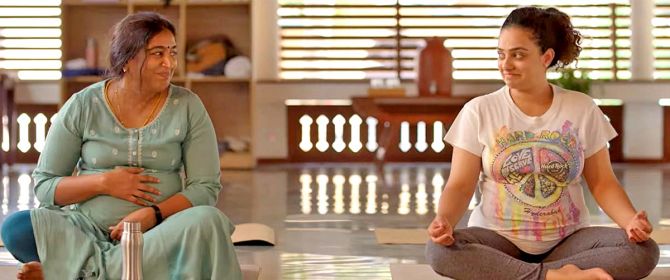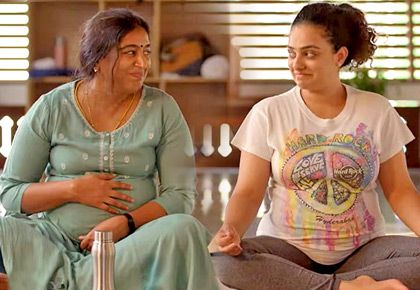What makes Wonder Women brilliant is the breeziness of the events and issues it tackles without delving on it too much or surrendering to it completely, observes Divya Nair.

The two red lines on a pregnancy kit can mean different things to different people.
Maybe that is what the makers of Wonder Women wanted to convey when cast members Parvathy Thiruvothu, Padmapriya, Sayonara Philip, Archana Padmini and Amruta Subhash posted a picture of a toolkit along with a pacifier on their personal social media three weeks ahead of the film's release.
Netizens, as usual, were quick to judge and jump into conclusions.
While most unsuspecting individuals responded with 'Congratulations', some others played moral police labelling unmarried actors like Parvathy for encouraging pregnancy out of wedlock.
With Wonder Women, Director Anjali Menon takes on a beautiful journey of motherhood through the lives of six women from different backgrounds, who meet each other at a pre-natal class organised by Dr Nandita (Nadiya) somewhere in Kerala.
In the first session, when Nandita asks these moms-to-be to express how they are feeling. Each of the women try to say something that any of us could relate to -- fabulous, excited, hungry -- the women go on chirpingly as they introduce us to their world.
At the end of the session, as these women are guided to find their identities and hold on to it, their expressions change to 'anxious', 'nervous', 'confused' and 'nothing.'
Again, relatable.
As days pass by, five of these women find ways and reasons to bond with each other, but Mini (Parvathy), who plays a single mother on the verge of separation, chooses to distance herself from the group.
Meanwhile, a WhatsApp group is created where the women discuss their daily struggles, doubts and share useful information. For example, why are women always pictured as lying down while giving birth, when there's half a dozen more ways to bring out a baby? The answer, I am sure, will surprise at least some of you.
What makes Wonder Women brilliant is the breeziness of the events and issues it tackles without delving on it too much or surrendering to it completely.
In the first scene, when Jaya, a Maharashtrian mom-to-be, requests Nandita to speak in Hindi because it is the 'rashtriya bhasha' as she doesn't understand English, the rest of the women pounce on her for calling them 'Madrasi'.
Even as they school her that South India is very much a part of India with diverse languages such as Malayalam, Kannada, Telugu, Tulu and Tamil, Jaya's husband interrupts and explains everyone in broken English their story of three miscarriages and how far they have come to be a part of this experience.
Their story immediately changes the vibe of the room.
Instead of correcting someone, taking a stand or vilifying Jaya, Nandita mentions that the rest of the women should be inspired by her 'assertiveness' because ultimately, we are all here to learn.
There are multiple instances like these where the film touches upon issues like patriarchy and mental well being in a refined way without really denigrating an idea, individual or community.
Nandita's idea behind calling these moms superheroes is another masterstroke.
A lot of people may call it a women-friendly film, but it's not.
Wonder Women is as much about its women as much as it's about its men and the people who make ordinary women superheroes.
For instance, when Saya (Sayonara Philip)'s live-in partner Jojo calls her a 'Goddess who is creating magic', she immediately shuts him down.
'I am not a goddess, I am just a woman. A moody, irritable woman,' she corrects him.
Some of you might find it rude of Saya to speak to a caring, lovable, sweetheart like Jojo. But you'd also realise that there is more honesty in the conversation than the hackneyed 'I will be there for you' that any one would be tempted to add without giving much thought.
What makes Wonder Women extraordinary is how Director Anjali goes out of the way to prove that a mother-in-law may not necessarily have to be the villain of your story.
Yes, she may have her reservations, but each one is different and there is always room for recovery. Even if you remove the pregnancy bit, Wonder Women teaches us to discover ourselves first, be empathetic and hold space for others.
Anjali's choice of characters -- the effervescent Veni, the nervous Norah, the standoffish Mini, the perturbed Jaya -- who effortlessly blend into their characters without overwhelming each other, is another reason why this film triumphs in conveying both its story and purpose.
In many ways, Wonder Women is also a story of courage and hope.
Even if it's a film and a fictional one, when you see a woman who has lost her own baby courageously helping another one give life, it tugs at your heartstrings.
Wonder Women is a must watch for all ages because as they say, it takes a village to raise a child. Even if you are not a parent, or want to be one, it has enough information that will help you be empathetic of someone else's journey of bringing a life into this world.
Wonder Women streams on SonyLIV.

- MOVIE REVIEWS

